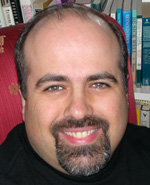Rafael Campo, “The Olive Grove”
How many centuries ago these trees
were planted is unknown, but some have guessed
the Romans planned these hilltop terraces.
The scowling faces in the bark agree
on nothing in their silent arguments,
except that they’ll bear fruit again, green globes
hard with their bitterness. The sunset glows
and sends long shadows stretching through their midst,akin to how I yearn for you—how old
is need, how tangled up in ancient knots.
You’ve wandered off from me, drawn by the scents
of lavender and jasmine on the cold
breeze rising up from where a garden pleads:
the olive grove’s grudged shelter seems betrayed.
 From The Enemy, the fifth collection of poems from Rafael Campo. Other Campo poems online include “The Distant Moon” (from the Academy of American Poets website), “Madonna and Child” (Slate, with audio), and “Living With Illness” and “The Blackouts” (The Cortlandt Review, with audio).
From The Enemy, the fifth collection of poems from Rafael Campo. Other Campo poems online include “The Distant Moon” (from the Academy of American Poets website), “Madonna and Child” (Slate, with audio), and “Living With Illness” and “The Blackouts” (The Cortlandt Review, with audio).
In an interview with Robert Birnbaum, Campo, who teaches and practices general internal medicine at Harvard, discusses his belief in the healing power of poetry: “There are many examples of language that biomedicine uses as a way, as a means of control and asserting its authority over those aspects of the illness experience that, quite frankly, we can’t control,” he says. “That’s where poetry, where narrative, where language really comes into its own as the indispensable instrument that it is. This moment where at the end of life, where another round of chemotherapy is just not going to do anything. Then that’s when the patient tells their story—where you hear it for the first time, if we are present. Most oncologists hightail it out of there because they don’t want to be around when someone is actually dying. Those are the moments where stories and poems have their greatest relevance to care providers and something we should pay more attention to in taking care of patients.”
27 January 2008 | poetry |

 Our Endless and Proper Work is my new book with Belt Publishing about starting (and sticking to) a productive writing practice.
Our Endless and Proper Work is my new book with Belt Publishing about starting (and sticking to) a productive writing practice. 
